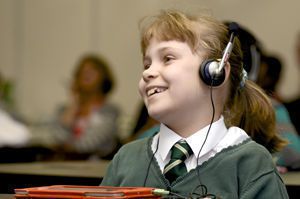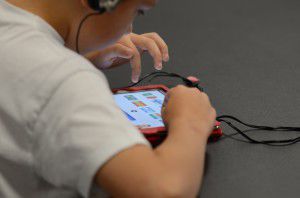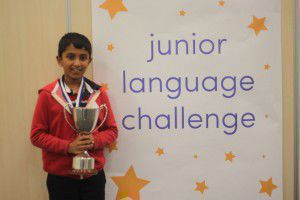3 surprising facts about the relationship between language and music
It’s often said that music is the “universal language of mankind”. Indeed, like language, music has great expressive power, and manages to convey a vast array of sentiments and emotions, even without the use of words. But just how connected are language and music? Research suggests that the relationship between the two may be even stronger than it appears at first glance. Let’s take a look at some of the surprising ways in which language and music are connected.

You’re not likely to confuse Beethoven’s Fifth for Lincoln’s second Inaugural Address, but music and language have more in common than you might think. Image via Derek Gleeson / Wikipedia
1. They share the same basic building blocks
Even on a very basic level, music and language are similar in that both are compositional. This means they are made of small parts that combine to create something larger and more meaningful; in other words, their whole is greater than the sum of their parts.
For example, languages consist of individual words that combine in meaningful ways to create sentences. In isolation, the words “I”, “you”, and “love” don’t mean much — but when combined into a sentence, “I love you”, suddenly they carry great importance.
Similarly, music — at its most basic level — consists of individual notes. Like words, these aren’t particularly meaningful by themselves: hearing an E flat in isolation likely won’t stir up any serious emotions. But when you combine the E flat with a C and a G, you have a C minor chord: something meaningful has been formed.
2. They involve the same areas of the brain
For decades, scientists have isolated specific brain regions that are responsible for the comprehension and production of language. One of the more notable regions is Broca’s area, which is located in the left-hemisphere frontal lobe and plays a crucial role in language comprehension and production. Specifically, Broca’s area seems to be responsible for our ability to use syntax —the structural rules that languages have so that sentences make sense.
Recent studies have also found that Broca’s area is crucial in the comprehension and analysis of music. Indeed, brain scans have found increased neural activity in Broca’s area when subjects heard and interpreted both speech and music. Further, research shows that, compared to non-musicians, musicians have a greater volume of grey matter in Broca’s area, suggesting that Broca’s area may be responsible for both speech and music.
3. Musical training can improve language skills

Image via Montserrat Labiaga Ferrer / flickr
In 2011, developmental psychologists from Justus-Liebig University in Germany conducted a study to examine the relationship between the development of music skills and language skills. To do this, they separated pre-schoolers into two groups, one of which received daily music lessons at school.
Later, they measured the pre-schoolers’ phonological awareness, which refers to their general ability to use and manipulate language. For example, children with good phonological awareness can recognize when words rhyme, can successfully identify individual sounds within words, and can blend together individual sounds to create words. Early phonological awareness has been shown to be a predictor of enhanced reading skills later in life.
The study found that the children who received daily music lessons ended up with higher levels of phonological awareness than those who did not. This suggests that the development of music skills and language skills go hand in hand, which makes sense if music and language are served by the same underlying brain areas.
As you can see, there are more parallels between language and music than meet the eye! On both a descriptive and neural level, language and music have a lot in common. As language learners, you can take advantage of this relationship by incorporating foreign-language music into your daily language-learning routine. In addition to providing you with great music to listen to, you’ll be exercising the same part of your brain that’s responsible for language skills.
Do you listen to music in your target language? What are some of your favorite foreign-language songs? Let us know — leave a comment!
Paul writes on behalf of Language Trainers, a language tutoring service that offers German classes in Dublin, as well as courses for other languages all throughout the world. You can check out their free foreign-language level tests and other language-learning resources on their website. Visit their Facebook page or contact paul@languagetrainers.com if you have any questions or if you’d like more information.
Junior Language Challenge: why Portuguese?
The Junior Language Challenge 2015 launched last week, with children all over the UK learning Portuguese in the first round of our national competition. If you’re wondering why we picked Portuguese, here are a few fun facts about one of the world’s most widely spoken languages.
Boa sorte to everyone taking part in the Junior Language Challenge – and if you’re a parent or teacher of children aged 10 or under, take a look at the JLC website to find out more – it’s a lot of fun!
Portuguese facts and figures
 Portuguese is the official language of Brazil, Mozambique, Angola, Portugal, Guinea-Bissau, East Timor, Equatorial Guinea, Cape Verde, and São Tomé and Príncipe.
Portuguese is the official language of Brazil, Mozambique, Angola, Portugal, Guinea-Bissau, East Timor, Equatorial Guinea, Cape Verde, and São Tomé and Príncipe.
It’s a Romance language, along with French, Spanish, Italian and Romanian. This family of modern languages derives from Latin, which was spoken in the Roman Empire – hence the name.
Portuguese is the second most spoken of the Romance languages, after Spanish, and it’s the seventh most widely spoken language in the world. That said, there are significant differences between European and Brazilian Portuguese, so make sure you learn the right one before you travel! (We offer both…)
Portuguese and English
Some Portuguese words that we’ve adopted in English – piranha, flamingo, cobra, albino, palaver, mosquito. Does anyone know any more?
Saudade is a word with no direct English translation, which means a feeling of longing or nostalgia for someone or something that may never return.
Famous Portuguese speakers
José de Sousa Saramago (1922-2010), who won the Nobel Prize in Literature in 1998.
Luís Vaz de Camões (1524-1580), often considered the Portuguese language’s greatest poet, and best known for his epic work, Os Lusíadas.
Explorers Vasco da Gama, the first person to sail directly from Europe to India, and Ferdinand Magellan, the first to sail around the world. Some people also think that Christopher Columbus was Portuguese too, although most agree he was actually Italian.
Footballer Cristiano Ronaldo and manager Jose Mourinho, who are both from Portugal.
Actor Rodrigo Santoro and former racing driver Rubens Barrichello both come from Brazil, as did singer and actress Carmen Miranda.
Portuguese idioms
Like every language, Portuguese has its own idioms. Here are a few of our favourites:
A galinha do vizinho é sempre mais gorda
Translation: your neighbour’s chicken is always fatter
Meaning in English: the grass is always greener on the other side
Burro velho não aprende línguas
Translation: an old donkey doesn’t learn languages
Meaning in English: you can’t teach an old dog new tricks
Água mole em pedra dura tanto bate até que fura
Translation: water dripping day by day wears the hardest rock away
Meaning in English: persistence pays off
Did you know?
Tom Hanks, Keanu Reeves, James Franco and Nelly Furtado all have Portuguese heritage.
There’s an interactive Museum of the Portuguese Language, which opened in 2006 in São Paulo, Brazil. The 12,000 square foot museum is in the Estação da Luz train station.
Most importantly…
Portuguese was the language learnt by Colin Firth in Love Actually, so that he could ask a girl to marry him.
5 reasons to join the Junior Language Challenge
If you’re a regular follower, you’ll have heard us talk in past years about the Junior Language Challenge, our annual competition for primary school children across the UK. This year’s challenge is now underway, and here’s why we want every child who’ll be aged 10 and under on 1st September 2015 to join in:
1. It makes languages fun
All parents and teachers know that children learn best when they’re enjoying themselves (as we all do – not just children!). So the JLC uses games and the competition element to make languages fun. We want every child who takes part in the JLC to come away from it with a new love of languages, and eager to continue with them as they move on to secondary school.
2. It introduces children to languages they’ve never heard of
Last year, children taking part in the competition learnt Italian, Japanese and Somali. This year, they’ll be starting with Portuguese. We like to offer exciting, different languages – because once a child knows they can learn Chichewa, suddenly French and Spanish won’t seem so daunting. And it encourages them to learn about other cultures and countries, some of which they may never have heard of before.
3. It doesn’t take up loads of teacher or parent time
We know teachers and parents are busy people. That’s why the JLC is designed to be as easy as possible to set up. We’ve even created this letter to parents, which explains what it’s all about. Everything’s done online, so once you’ve got them registered, children can login on any computer and keep learning. Our system records all the scores, so the only thing we need from the grown-ups once they’re up and running is encouragement!
4. It’s for charity
The JLC doesn’t just benefit the children who take part; it also raises money for our charity, onebillion. They’re doing fantastic work creating apps to transform the education of one billion children in developing countries, and we’re proud to support them. Each child who enters the competition pays a £5 entry fee, all of which is donated to the organisation.
5. There are some great prizes on offer
The JLC champion wins a once-in-a-lifetime family holiday to Africa (our 2013 winner, Ella, wrote us this fantastic report about her trip to Malawi). There are also prizes for the runners-up – in previous years these have included iPods and cameras – and goodie bags for everyone who makes it through to round 2 and beyond, including t-shirts, pens, and other treats, as well as discounts on EuroTalk software for the children and their schools.
Registration is open now for school groups and individuals. Teachers can register their school for free, to take a look and try out the games before deciding whether to sign up any pupils.
If you’d like more details about the Junior Language Challenge, or to join in, visit the website or email us.
And if you know anyone else who might be interested, please spread the word!
Good luck to everyone taking part this year. Or should we say Boa sorte 🙂
Are translation apps really the answer for travellers?
The first thing you need to do before embarking on a trip to a foreign land is to start learning the language. This will not only impress the locals, but will also make your visit easier and more enjoyable. In this hectic era, however, you may be forgiven for not dedicating the time necessary for learning a new language. In such instances, one might rely on a translation app to help fill in the gaps in your knowledge. But are these apps really an alternative to learning the language?
Of course you will continue to learn a lot while you are abroad. Simply engaging in conversation and navigating the signs and menus will put your skills to the test and improve them in the process. You can use any spare time to enhance your language learning with apps like uTalk. It’s a handy way to learn 111 languages while you’re on the move.
 If you are really stuck though, and haven’t managed to learn anything but a few basic phrases, then you may turn to a different kind of app. iOS, Android and Windows Phone all offer some great apps for translating speech in real time. It’s the sort of technology that was previously associated with science fiction, but now you can download it for free. The Google Translate app is one of the most popular real-time speech translation apps for Android and iOS, and it works in 50 languages. Skype also launched a real time translation option recently, and although it is probably the most advanced in terms of technology, it’s only available in two languages at present. Technology like this will inevitably change the way we think about global travel.
If you are really stuck though, and haven’t managed to learn anything but a few basic phrases, then you may turn to a different kind of app. iOS, Android and Windows Phone all offer some great apps for translating speech in real time. It’s the sort of technology that was previously associated with science fiction, but now you can download it for free. The Google Translate app is one of the most popular real-time speech translation apps for Android and iOS, and it works in 50 languages. Skype also launched a real time translation option recently, and although it is probably the most advanced in terms of technology, it’s only available in two languages at present. Technology like this will inevitably change the way we think about global travel.
I have tested many of these apps and have found that they can be a godsend when you are searching for that one elusive word to help you get your point across. You can also try to convince a bewildered local to speak into the phone in the hopes that the voice recognition software and the translation software work well enough to produce a coherent sentence. Unfortunately such apps are still a long way from perfect, as factors such as regional dialects and background noise can seriously impact the quality of the translations.
There are also practical problems posed by using a translation app in a restaurant or train station. You shouldn’t be surprised to hear irritated grunts of derision from locals, especially if there is a queue behind you. That’s why far from being a substitute for language learning, these apps are at best a means to supplement a traveller’s existing language skills.
At first such groundbreaking technology seems as though it holds the revolutionary potential to knock down language barriers and make language learning redundant. But although the level of technology available now is far beyond what it was a decade ago, there’s still plenty of room for improvement. It takes a human mind to understand the nuances of language and intended meaning. These apps might be great for ordering food on holiday, but you can’t use them to have meaningful conversations or to translate literature. The day such apps finally make language learning redundant will be the same day that translation technology replaces professional translation services.
Author biog: Tom Rowsell is a writer and language enthusiast from East London. His fascination with language began while studying Old English literature at University.
Interesting idioms from around the world
No matter what language you’re learning, at some point you’ll probably come across idioms. These phrases, on the surface, seem to mean very little and yet, to native speakers, they roll easily off the tongue without a moment’s thought. In a recent post, we covered Chinese chengyu, idiomatic expressions that each have their own fascinating story. And English is full of strange idioms – ‘to have a chip on your shoulder’, for instance, or ‘to pull someone’s leg’. Very confusing if you’re not very familiar with the language.
Idioms are a tricky part of the language learning process, but well worth it if you can get a few under your belt… 😉 Being able to drop a few colloquial expressions into your speech in the right context will not only boost your confidence, but it’ll also impress whoever you’re talking to!
So here are just a few of our favourite idioms from around the world:
Aus einer Mücke einen Elefanten machen (German)
Literally: To make a mosquito out of an elephant
Meaning: To make a fuss out of nothing
 Énêhpoése ma’eno (Cheyenne)
Énêhpoése ma’eno (Cheyenne)
Literally: The turtle is shrouded
Meaning: It’s foggy
猿も木から落ちる (Saru mo ki kara ochiru) (Japanese)
Literally: Even monkeys fall from trees
Meaning: Even experts get it wrong
Ar gefn ei geffyl gwyn (Welsh)
Literally: On the back of his white horse
Meaning: Full of mischief
Hak mir nisht kin chaynik (Yiddish)
Literally: Don’t chop my teakettle
Meaning: Stop annoying me
Les chiens ne font pas des chats (French)
Literally: Dogs don’t breed cats
Meaning: Like father, like son
chang.sa.rgyag (Tibetan)
Literally: To put up a beer tent
Meaning: To get married
Aquí hay gato encerrado (Spanish)
Literally: there’s a trapped cat here
Meaning: there’s something odd going on
бурхан оршоо бутын чинээ сахал урга (Burkhan orshoo butin chinee sakhal urga) (Mongolian)
Literally: God bless you and may your moustache grow like brushwood
Meaning: Bless you (when someone sneezes)
Avere gli occhi foderati di prociutto (Italian)
Literally: To have one’s eyes lined with ham
Meaning: To be unable to see something that’s plainly obvious
Have you discovered any fun idioms in the language you’re learning? Let us know in the comments!






